新策略大学英语读写教程翻译五篇加重点注释
新策略3原文加翻译

大学英语新策略原文加翻译第一单元A career is the sum total of all of your work-related contributions to society in a lifetime. This includes time and effort spent to provide goods, services, or benefit to others. A career includes paid, un-paid, volunteer, part-time, andfull-time positions. Your career includes many life roles you may not think of: student, homemaker, babysitter, office worker, doctor, lawyer, etc. A career encompasses all the roles you play and duties you perform. You may have many jobs or positions that make up your career, but you only have one overall career. There are various career options in the modern world of work: Self-Employed, Organization Employed, or Project-Employed.By definition, career development is the interaction of psychological, sociological, economic, physical and chance factors that shape the sequence of jobs, occupations, or positions a person may engage in throughout his or her lifetime. Career development is an ongoing process that includes the aspects of planning and strategizing your career based on information about your self, the world of work, thematch between them, and the action you will take to create your life’s work. Formal career development occurs in high schools, colleges and universities, adult education programs, business and industry, military, community and government agencies, trade and technical schools. Consider all the places you have developed your career with either academic or work experience. Where can you go next and what can you do to further develop your career?You have the power to create what you want, whether you wish to be self-employed, change career fields entirely, hold a certain kind of position, or volunteer your time. Smart career development requires you to be self-reflective, resourceful, motivated, flexible, and able to keep your skills and competencies up-to-date.Contemporary Career ConceptsStatistics say that we will experience many job transitions throughout our life. For example: the U.S. Department of Labor says that the average person will have 3.5 different careers in his lifetime and work for ten employers, keeping each job for 3.5 years.From the 1995 National Association of Colleges and Employers Journal of Career Planning, ―The average American beginning his or her career in the 1990s will probably work in ten or more jobs for five or more employers before retiring.‖In the mid 1990s, Richard Knowdell said, ―Career planning in the 1950s and 1960s was like riding on a train. The train remained on the track and one could quite possibly stay on that track until retirement day. In the 1970s and 1980s career planning was like getting on a bus. One could change buses and it was a little closer to driving than on a train. For the 1990s and beyond, career planning is more like an all-terrain vehicle. The worker gets to drive, has to read the map, and has to be attuned to the terrain, which could change from moment to moment.‖When I attended a recent California Career Development Conference, I heard several other metaphors to describe the career development process. One person said, ―The old career was a marriage. The new career is a date.‖ And someone else mentioned, ―A career is like going to an amusement park, where you go from one ride to the next.‖Obviously, the concept of climbing the career ladder is antiquated. Rather than ―moving up‖ in one organization, you will find yourself moving up, down, and even off the ladder. It could, in fact, seem more like a maze, with many twists and turns, stops and starts.My own concept of career is like a wardrobe, where you ―try on‖ different outfits throughout your lifetime, and continue to check the mirror to see if it still fits and matches your current style and taste. In the modern world of work, you will need to find work that is ―suited‖ to you. Think of your life’s work as your wardrobe. It is ever-changing as you move through life, changing as your styles and interests change. Throughout the process, you will be tailoring yourself to fit different roles, and to meet changing work styles and expectations.Thus, today, the way in which we go about planning and strategizing our work life is constantly changing. We are taking a more proactive—therefore more exciting and challenging approach— to managing which way our career takes us. People are daring to walk their unique paths, and ignoring traditional routes. In fact, tomorrow’s jobs are relatively unknown to us at this time, as there will be new titlesand new career fields that will develop. If a modern career is like a wardrobe, you will wear many kinds of outfits throughout a lifetime, sometimes mixing and matching ensembles, but always checking to see that it still reflects your current style and remains a good fit. It has been said that clothes make the man–what you are displaying to the world through your choice of clothing is how you express yourself. Similarly, how you express yourself and what you value is reflected in the work you choose to perform.As Mark Twain said, ―There is no security in life, only opportunity.‖ Given today’s cha nging times, we cannot hold onto one idea for very long—there is so much good work that must be done to help us evolve to our fullest potential. We are multi-talented, multi-faceted beings with many gifts to share. We cannot lock ourselves into any one job or job path. We must walk our path, but remain flexible and open to new experiences. We also need to learn our lessons along the way. Each job, no matter how small, is meaningful and is part ofour career plan in that we are always building onto our careers. Today’s work will prepare us for tomorrow’s opportunities.何为事业呢?A career is the sum total of all of your work-related contributions to society in a lifetime. 一个人的事业是之总和,你所有的工作对社会的贡献在一生。
新视野大学英语读写教程第三版第二册1-5单元-A课文及翻译

unit 1unit 1 An IMPRESSIVE English lesson 一堂难忘的英语课1. If I am the only parent who still corrects his child’s English, then perhaps my son is right. To him, I am a tedious oddity: a father he is obliged to listen to and a man absorbed in the rules of grammar, which my son seems allergic to.如果我是唯一一个还在纠正小孩英语的家长,那么我儿子也许是对的。
对他而言,我是一个乏味的怪物:一个他不得不听其教诲的父亲,一个还沉湎于语法规则的人,对此我儿子似乎颇为反感。
2. I think I got serious about this only recently when I ran into one of my former stud ents, fresh from an excursion to Europe .“How was it” I asked, full of earnest anticipation.我觉得我是在最近偶遇我以前的一位学生时,才开始对这个问题认真起来的。
这个学生刚从欧洲旅游回来。
我满怀着诚挚期待问她:“欧洲之行如何?”3. She nodded three or four times searched the heavens for the right words, and then exclaimed, it was like, whoa!"她点了三四下头,绞尽脑汁,苦苦寻找恰当的词语,然后惊呼:“真是,哇!”4. And that was it. The civilization of Greece and the glory of Roman architecture we re captured in condensed non-statement. My student “whoa” was exceeded only by my head-shaking distress.没了。
新视野大学英语读写教程1-5单元课文中文标准翻译
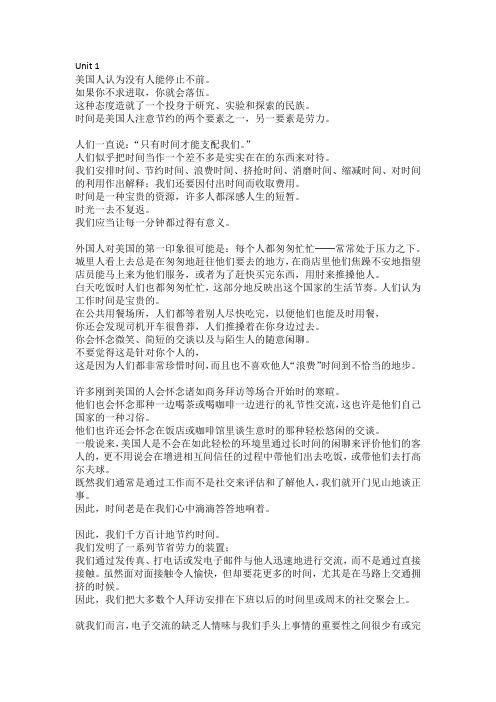
Unit 1美国人认为没有人能停止不前。
如果你不求进取,你就会落伍。
这种态度造就了一个投身于研究、实验和探索的民族。
时间是美国人注意节约的两个要素之一,另一要素是劳力。
人们一直说:“只有时间才能支配我们。
”人们似乎把时间当作一个差不多是实实在在的东西来对待。
我们安排时间、节约时间、浪费时间、挤抢时间、消磨时间、缩减时间、对时间的利用作出解释;我们还要因付出时间而收取费用。
时间是一种宝贵的资源,许多人都深感人生的短暂。
时光一去不复返。
我们应当让每一分钟都过得有意义。
外国人对美国的第一印象很可能是:每个人都匆匆忙忙──常常处于压力之下。
城里人看上去总是在匆匆地赶往他们要去的地方,在商店里他们焦躁不安地指望店员能马上来为他们服务,或者为了赶快买完东西,用肘来推搡他人。
白天吃饭时人们也都匆匆忙忙,这部分地反映出这个国家的生活节奏。
人们认为工作时间是宝贵的。
在公共用餐场所,人们都等着别人尽快吃完,以便他们也能及时用餐,你还会发现司机开车很鲁莽,人们推搡着在你身边过去。
你会怀念微笑、简短的交谈以及与陌生人的随意闲聊。
不要觉得这是针对你个人的,这是因为人们都非常珍惜时间,而且也不喜欢他人“浪费”时间到不恰当的地步。
许多刚到美国的人会怀念诸如商务拜访等场合开始时的寒暄。
他们也会怀念那种一边喝茶或喝咖啡一边进行的礼节性交流,这也许是他们自己国家的一种习俗。
他们也许还会怀念在饭店或咖啡馆里谈生意时的那种轻松悠闲的交谈。
一般说来,美国人是不会在如此轻松的环境里通过长时间的闲聊来评价他们的客人的,更不用说会在增进相互间信任的过程中带他们出去吃饭,或带他们去打高尔夫球。
既然我们通常是通过工作而不是社交来评估和了解他人,我们就开门见山地谈正事。
因此,时间老是在我们心中滴滴答答地响着。
因此,我们千方百计地节约时间。
我们发明了一系列节省劳力的装置;我们通过发传真、打电话或发电子邮件与他人迅速地进行交流,而不是通过直接接触。
虽然面对面接触令人愉快,但却要花更多的时间,尤其是在马路上交通拥挤的时候。
新策略大学英语读写教程(2)翻译五篇加重点注释
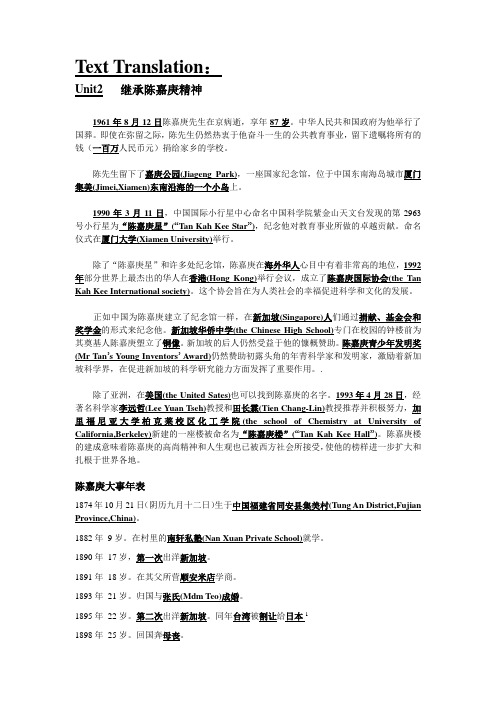
Text Translation:Unit2 继承陈嘉庚精神1961年8月12日陈嘉庚先生在京病逝,享年87岁。
中华人民共和国政府为他举行了国葬。
即使在弥留之际,陈先生仍然热衷于他奋斗一生的公共教育事业,留下遗嘱将所有的钱(一百万人民币元)捐给家乡的学校。
陈先生留下了嘉庚公园(Jiageng Park),一座国家纪念馆,位于中国东南海岛城市厦门集美(Jimei,Xiamen)东南沿海的一个小岛上。
1990年3月11日,中国国际小行星中心命名中国科学院紫金山天文台发现的第2963号小行星为“陈嘉庚星”(“Tan Kah Kee Star”),纪念他对教育事业所做的卓越贡献。
命名仪式在厦门大学(Xiamen University)举行。
除了“陈嘉庚星”和许多处纪念馆,陈嘉庚在海外华人心目中有着非常高的地位,1992年部分世界上最杰出的华人在香港(Hong Kong)举行会议,成立了陈嘉庚国际协会(the Tan Kah Kee International society)。
这个协会旨在为人类社会的幸福促进科学和文化的发展。
正如中国为陈嘉庚建立了纪念馆一样,在新加坡(Singapore)人们通过捐献、基金会和奖学金的形式来纪念他。
新加坡华侨中学(the Chinese High School)专门在校园的钟楼前为其奠基人陈嘉庚塑立了铜像。
新加坡的后人仍然受益于他的慷概赞助。
陈嘉庚青少年发明奖(Mr Tan’s Young Inventors’ Award)仍然赞助初露头角的年青科学家和发明家,激励着新加坡科学界,在促进新加坡的科学研究能力方面发挥了重要作用。
.除了亚洲,在美国(the United Sates)也可以找到陈嘉庚的名字。
1993年4月28日,经著名科学家李远哲(Lee Yuan Tseh)教授和田长霖(Tien Chang-Lin)教授推荐并积极努力,加里福尼亚大学柏克莱校区化工学院(the school of Chemistry at University of California,Berkeley)新建的一座楼被命名为“陈嘉庚楼”(“Tan Kah Kee Hall”)。
新视野大学英语读写教程【第三版】第四册课文原文与翻译
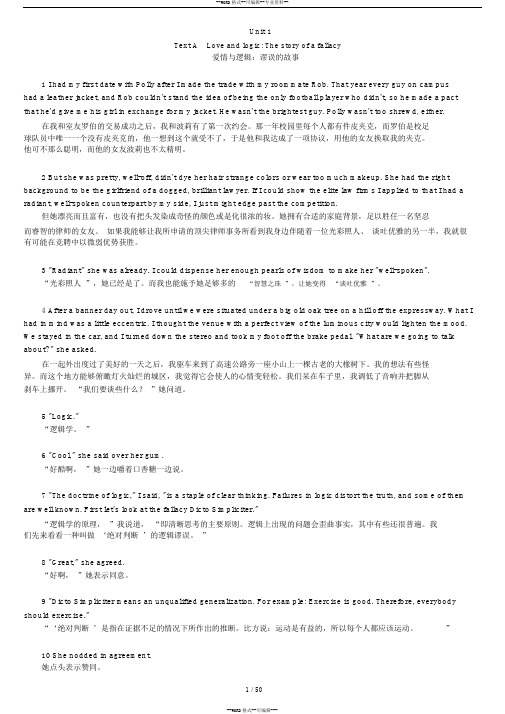
Unit 1Text A Love and logic: The story of a fallacy爱情与逻辑:谬误的故事1 I had my first date with Polly after I made the trade with my roommate Rob. That year every guy on campushad a leather jacket, and Rob couldn't stand the idea of being the only football player who didn't, so he made a pact that he'd give me his girl in exchange for my jacket. He wasn't the brightest guy. Polly wasn't too shrewd, either.在我和室友罗伯的交易成功之后,我和波莉有了第一次约会。
那一年校园里每个人都有件皮夹克,而罗伯是校足球队员中唯一一个没有皮夹克的,他一想到这个就受不了,于是他和我达成了一项协议,用他的女友换取我的夹克。
他可不那么聪明,而他的女友波莉也不太精明。
2 But she was pretty, well-off, didn't dye her hair strange colors or wear too much makeup. She had the right background to be the girlfriend of a dogged, brilliant lawyer. If I could show the elite law firms I applied to that I had a radiant, well-spoken counterpart by my side, I just might edge past the competition.但她漂亮而且富有,也没有把头发染成奇怪的颜色或是化很浓的妆。
新视野大学英语第三版读写教程课文翻译

读写教程01 课文翻译Unit01TestA奔向更加光明的未来1 下午好!作为校长,我非常自豪地欢迎你们来到这所大学。
你们所取得的成就是你们自己多年努力的结果,也是你们的父母和老师们多年努力的结果。
在这所大学里,我们承诺将使你们学有所成。
2 在欢迎你们到来的这一刻,我想起自己高中毕业时的情景,还有妈妈为我和爸爸拍的合影。
妈妈吩咐我们:“姿势自然点。
”“等一等, ”爸爸说,“把我递给他闹钟的情景拍下来。
”在大学期间,那个闹钟每天早晨叫醒我。
至今它还放在我办公室的桌子上。
3 让我来告诉你们一些你们未必预料得到的事情。
你们将会怀念以前的生活习惯,怀念父母曾经提醒你们要刻苦学习、取得佳绩。
你们可能因为高中生活终于结束而喜极而泣,你们的父母也可能因为终于不用再给你们洗衣服而喜极而泣!但是要记住:未来是建立在过去扎实的基础上的。
4 对你们而言,接下来的四年将会是无与伦比的一段时光。
在这里,你们拥有丰富的资源:有来自全国各地的有趣的学生,有学识渊博又充满爱心的老师,有综合性图书馆,有完备的运动设施,还有针对不同兴趣的学生社团——从文科社团到理科社团、到社区服务等等。
你们将自由地探索、学习新科目。
你们要学着习惯点灯熬油,学着结交充满魅力的人,学着去追求新的爱好。
我想鼓励你们充分利用这一特殊的经历,并用你们的干劲和热情去收获这一机会所带来的丰硕成果。
5 有这么多课程可供选择,你可能会不知所措。
你不可能选修所有的课程,但是要尽可能体验更多的课程!大学里有很多事情可做可学,每件事情都会为你提供不同视角来审视世界。
如果我只能给你们一条选课建议的话,那就是:挑战自己!不要认为你早就了解自己对什么样的领域最感兴趣。
选择一些你从未接触过的领域的课程。
这样,你不仅会变得更加博学,而且更有可能发现一个你未曾想到的、能成就你未来的爱好。
一个绝佳的例子就是时装设计师王薇薇,她最初学的是艺术史。
随着时间的推移,王薇薇把艺术史研究和对时装的热爱结合起来,并将其转化为对设计的热情,从而使她成为全球闻名的设计师。
新视野大学英语(第二版)读写教程第四册课文翻译(最新完整版)
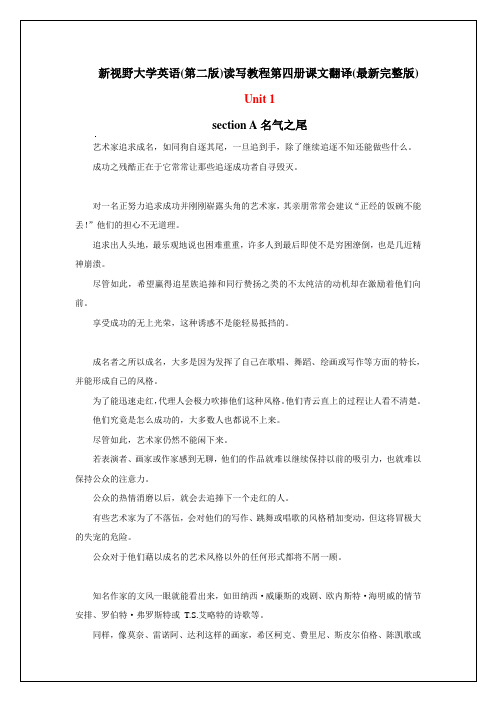
新视野大学英语(第二版)读写教程第四册课文翻译(最新完整版)Unit 1section A名气之尾艺术家追求成名,如同狗自逐其尾,一旦追到手,除了继续追逐不知还能做些什么。
成功之残酷正在于它常常让那些追逐成功者自寻毁灭。
对一名正努力追求成功并刚刚崭露头角的艺术家,其亲朋常常会建议“正经的饭碗不能丢!”他们的担心不无道理。
追求出人头地,最乐观地说也困难重重,许多人到最后即使不是穷困潦倒,也是几近精神崩溃。
尽管如此,希望赢得追星族追捧和同行赞扬之类的不太纯洁的动机却在激励着他们向前。
享受成功的无上光荣,这种诱惑不是能轻易抵挡的。
成名者之所以成名,大多是因为发挥了自己在歌唱、舞蹈、绘画或写作等方面的特长,并能形成自己的风格。
为了能迅速走红,代理人会极力吹捧他们这种风格。
他们青云直上的过程让人看不清楚。
他们究竟是怎么成功的,大多数人也都说不上来。
尽管如此,艺术家仍然不能闲下来。
若表演者、画家或作家感到无聊,他们的作品就难以继续保持以前的吸引力,也就难以保持公众的注意力。
公众的热情消磨以后,就会去追捧下一个走红的人。
有些艺术家为了不落伍,会对他们的写作、跳舞或唱歌的风格稍加变动,但这将冒极大的失宠的危险。
公众对于他们藉以成名的艺术风格以外的任何形式都将不屑一顾。
知名作家的文风一眼就能看出来,如田纳西·威廉斯的戏剧、欧内斯特·海明威的情节安排、罗伯特·弗罗斯特或T.S.艾略特的诗歌等。
同样,像莫奈、雷诺阿、达利这样的画家,希区柯克、费里尼、斯皮尔伯格、陈凯歌或张艺谋这样的电影制作人也是如此。
他们鲜明独特的艺术风格标志着与别人不同的艺术形式上的重大变革,这让他们名利双收,但也让他们付出了代价,那就是失去了用其他风格或形式表现自我的自由。
名气这盏聚光灯可比热带丛林还要炙热。
骗局很快会被揭穿,过多的关注带来的压力会让大多数人难以承受。
它让你失去自我。
你必须是公众认可的那个你,而不是真实的你或是可能的你。
新视野大学英语读写教程(第二版)第二册课文及翻译
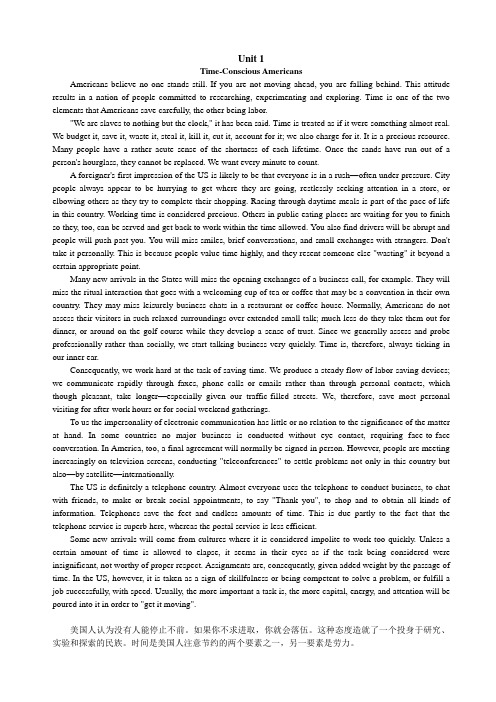
Unit 1Time-Conscious AmericansAmericans believe no one stands still. If you are not moving ahead, you are falling behind. This attitude results in a nation of people committed to researching, experimenting and exploring. Time is one of the two elements that Americans save carefully, the other being labor."We are slaves to nothing but the clock," it has been said. Time is treated as if it were something almost real. We budget it, save it, waste it, steal it, kill it, cut it, account for it; we also charge for it. It is a precious resource. Many people have a rather acute sense of the shortness of each lifetime. Once the sands have run out of a person's hourglass, they cannot be replaced. We want every minute to count.A foreigner's first impression of the US is likely to be that everyone is in a rush—often under pressure. City people always appear to be hurrying to get where they are going, restlessly seeking attention in a store, or elbowing others as they try to complete their shopping. Racing through daytime meals is part of the pace of life in this country. Working time is considered precious. Others in public eating-places are waiting for you to finish so they, too, can be served and get back to work within the time allowed. You also find drivers will be abrupt and people will push past you. You will miss smiles, brief conversations, and small exchanges with strangers. Don't take it personally. This is because people value time highly, and they resent someone else "wasting" it beyond a certain appropriate point.Many new arrivals in the States will miss the opening exchanges of a business call, for example. They will miss the ritual interaction that goes with a welcoming cup of tea or coffee that may be a convention in their own country. They may miss leisurely business chats in a restaurant or coffee house. Normally, Americans do not assess their visitors in such relaxed surroundings over extended small talk; much less do they take them out for dinner, or around on the golf course while they develop a sense of trust. Since we generally assess and probe professionally rather than socially, we start talking business very quickly. Time is, therefore, always ticking in our inner ear.Consequently, we work hard at the task of saving time. We produce a steady flow of labor-saving devices; we communicate rapidly through faxes, phone calls or emails rather than through personal contacts, which though pleasant, take longer—especially given our traffic-filled streets. We, therefore, save most personal visiting for after-work hours or for social weekend gatherings.To us the impersonality of electronic communication has little or no relation to the significance of the matter at hand. In some countries no major business is conducted without eye contact, requiring face-to-face conversation. In America, too, a final agreement will normally be signed in person. However, people are meeting increasingly on television screens, conducting "teleconferences" to settle problems not only in this country but also—by satellite—internationally.The US is definitely a telephone country. Almost everyone uses the telephone to conduct business, to chat with friends, to make or break social appointments, to say "Thank you", to shop and to obtain all kinds of information. Telephones save the feet and endless amounts of time. This is due partly to the fact that the telephone service is superb here, whereas the postal service is less efficient.Some new arrivals will come from cultures where it is considered impolite to work too quickly. Unless a certain amount of time is allowed to elapse, it seems in their eyes as if the task being considered were insignificant, not worthy of proper respect. Assignments are, consequently, given added weight by the passage of time. In the US, however, it is taken as a sign of skillfulness or being competent to solve a problem, or fulfill a job successfully, with speed. Usually, the more important a task is, the more capital, energy, and attention will be poured into it in order to "get it moving".美国人认为没有人能停止不前。
读写教程课文原文与翻译
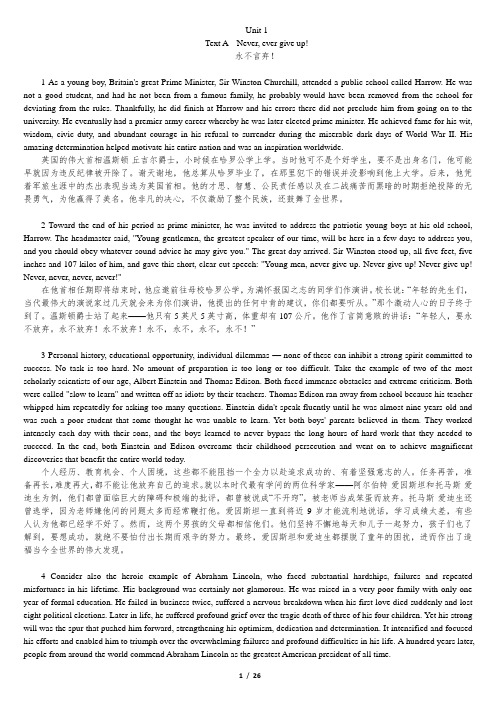
Unit 1Text A Never, ever give up!永不言弃!1 As a young boy, Britain's great Prime Minister, Sir Winston Churchill, attended a public school called Harrow. He was not a good student, and had he not been from a famous family, he probably would have been removed from the school for deviating from the rules. Thankfully, he did finish at Harrow and his errors there did not preclude him from going on to the university. He eventually had a premier army career whereby he was later elected prime minister. He achieved fame for his wit, wisdom, civic duty, and abundant courage in his refusal to surrender during the miserable dark days of World War II. His amazing determination helped motivate his entire nation and was an inspiration worldwide.英国的伟大首相温斯顿·丘吉尔爵士,小时候在哈罗公学上学。
当时他可不是个好学生,要不是出身名门,他可能早就因为违反纪律被开除了。
谢天谢地,他总算从哈罗毕业了,在那里犯下的错误并没影响到他上大学。
新视野大学英语读写教程5课后翻译
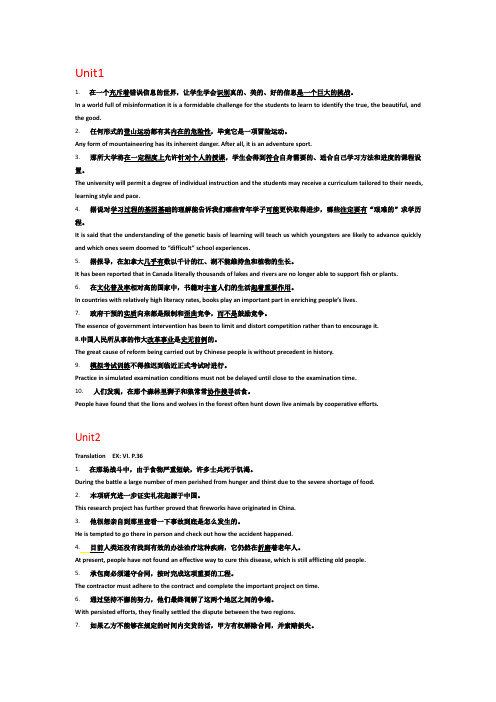
Unit11.在一个充斥着错误信息的世界,让学生学会识别真的、美的、好的信息是一个巨大的挑战。
In a world full of misinformation it is a formidable challenge for the students to learn to identify the true, the beautiful, and the good.2.任何形式的登山运动都有其内在的危险性,毕竟它是一项冒险运动。
Any form of mountaineering has its inherent danger. After all, it is an adventure sport.3.那所大学将在一定程度上允许针对个人的授课,学生会得到符合自身需要的、适合自己学习方法和进度的课程设置。
The university will permit a degree of individual instruction and the students may receive a curriculum tailored to their needs, learning style and pace.4.据说对学习过程的基因基础的理解能告诉我们哪些青年学子可能更快取得进步,哪些注定要有“艰难的”求学历程。
It is said that the understanding of the genetic basis of learning will teach us which youngsters are likely to advance quickly and which ones seem doomed to “difficult” school experiences.5.据报导,在加拿大几乎有数以千计的江、湖不能维持鱼和植物的生长。
It has been reported that in Canada literally thousands of lakes and rivers are no longer able to support fish or plants.6.在文化普及率相对高的国家中,书籍对丰富人们的生活起着重要作用。
新视野大学英语3读写教程(第二版)Unit3SectionA课文和翻译

新视野大学英语3读写教程(第二版)Unit3SectionA课文和翻译各位读友大家好,此文档由网络收集而来,欢迎您下载,谢谢篇一:新视野大学英语读写教程第二版第三册课文翻译Unit 1 sectionA我哥哥吉米出生时遇上难产,因为缺氧导致大脑受损。
两年后,我出生了。
从此以后,我的生活便围绕我哥哥转。
伴随我成长的,是“到外面去玩,把你哥哥也带上。
”不带上他,我是哪里也去不了的。
因此,我怂恿邻居的孩子到我家来,尽情地玩孩子们玩的游戏。
我母亲教吉米学习日常自理,比如刷牙或系皮带什么的。
我父亲宅心仁厚,他的耐心和理解使一家人心贴着心。
我则负责外面的事,找到那些欺负我哥哥的孩子们的父母,告他们的状,为我哥哥讨回公道。
父亲和吉米形影不离。
他们一道吃早饭,平时每天早上一道开车去海军航运中心,他们都在那里工作,吉米在那搬卸标有彩色代号的箱子。
晚饭后,他们一道交谈,玩游戏,直到深夜。
他们甚至用口哨吹相同的曲调。
所以,父亲1991年因心脏病去世时,吉米几乎崩溃了,尽管他尽量不表现出来。
他就是不能相信父亲去世这一事实。
通常,他是一个令人愉快的人,现在却一言不发,无论说多少话都不能透过他木然的脸部表情了解他的心事。
我雇了一个人和他住在一起,开车送他去上班。
然而,不管我怎么努力地维持原状,吉米还是认为他熟悉的世界已经消失了。
有一天,我问他:“你是不是想念爸爸?”他的嘴唇颤抖了几下,然后问我:“你怎么看,玛格丽特?他是我最好的朋友。
” 接着,我俩都流下了眼泪。
六个月后,母亲因肺癌去世,剩下我一人来照顾吉米。
吉米不能马上适应去上班时没有父亲陪着,因此搬来纽约和我一起住了一段时间。
我走到哪里他就跟到哪里,他好像适应得很好。
但吉米依然想住在我父母的房子里,继续干他原来的工作。
我答应把他送回去。
此事最后做成了。
如今,他在那里生活了11年,在许多人的照料下,同时依靠自己生活得有声有色。
他已成了邻里间不可或缺的人物。
如果你有邮件要收,或有狗要遛,他就是你所要的人。
新视野大学英语读写教程全四册课文翻译

新视野大学英语读写教程全四册课文翻译新视野大学英语读写教程第一册课文翻译Unit 1 Section A1. 学习外语是我一生中最艰苦也是最有意义的经历之一。
虽然时常遭遇挫折,但却非常有价值。
2. 我学外语的经历始于初中的第一堂英语课。
老师很慈祥耐心,时常表扬学生。
由于这种积极的教学方法,我踊跃回答各种问题,从不怕答错。
两年中,我的成绩一直名列前茅。
3. 到了高中后,我渴望继续学习英语。
然而,高中时的经历与以前大不相同。
以前,老师对所有的学生都很耐心,而新老师则总是惩罚答错的学生。
每当有谁回答错了,她就会用长教鞭指着我们,上下挥舞大喊:“错!错!错!”没有多久,我便不再渴望回答问题了。
我不仅失去了回答问题的乐趣,而且根本就不想再用英语说半个字。
4. 好在这种情况没持续多久。
到了大学,我了解到所有学生必须上英语课。
与高中老师不同,大学英语老师非常耐心和蔼,而且从来不带教鞭!不过情况却远不尽如人意。
由于班大,每堂课能轮到我回答的问题寥寥无几。
上了几周课后,我还发现许多同学的英语说得比我要好得多。
我开始产生一种畏惧感。
虽然原因与高中时不同,但我却又一次不敢开口了。
看来我的英语水平要永远停步不前了。
5. 直到几年后我有机会参加远程英语课程,情况才有所改善。
这种课程的媒介是一台电脑、一条电话线和一个调制解调器。
我很快配齐了必要的设备并跟一个朋友学会了电脑操作技术,于是我每周用5到7天在网上的虚拟课堂里学习英语。
6. 网上学习并不比普通的课堂学习容易。
它需要花许多的时间,需要学习者专心自律,以跟上课程进度。
我尽力达到课程的最低要求,并按时完成作业。
7. 我随时随地都在学习。
不管去哪里,我都随身携带一本袖珍字典和笔记本,笔记本上记着我遇到的生词。
我学习中出过许多错,有时是令人尴尬的错误。
有时我会因挫折而哭泣,有时甚至想放弃。
但我从未因别的同学英语说得比我快而感到畏惧,因为在电脑屏幕上作出回答之前,我可以根据自己的需要花时间去琢磨自己的想法。
新视野大学英语读写教程第五册课文翻译TheGoodnessinGuilt为负疚感正名
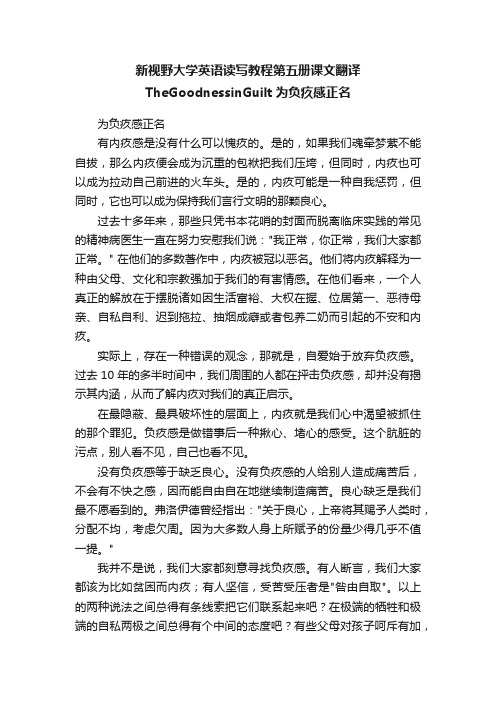
新视野大学英语读写教程第五册课文翻译TheGoodnessinGuilt为负疚感正名为负疚感正名有内疚感是没有什么可以愧疚的。
是的,如果我们魂牵梦萦不能自拔,那么内疚便会成为沉重的包袱把我们压垮,但同时,内疚也可以成为拉动自己前进的火车头。
是的,内疚可能是一种自我惩罚,但同时,它也可以成为保持我们言行文明的那颗良心。
过去十多年来,那些只凭书本花哨的封面而脱离临床实践的常见的精神病医生一直在努力安慰我们说:"我正常,你正常,我们大家都正常。
" 在他们的多数著作中,内疚被冠以恶名。
他们将内疚解释为一种由父母、文化和宗教强加于我们的有害情感。
在他们看来,一个人真正的解放在于摆脱诸如因生活富裕、大权在握、位居第一、恶待母亲、自私自利、迟到拖拉、抽烟成癖或者包养二奶而引起的不安和内疚。
实际上,存在一种错误的观念,那就是,自爱始于放弃负疚感。
过去10年的多半时间中,我们周围的人都在抨击负疚感,却并没有揭示其内涵,从而了解内疚对我们的真正启示。
在最隐蔽、最具破坏性的层面上,内疚就是我们心中渴望被抓住的那个罪犯。
负疚感是做错事后一种揪心、堵心的感受。
这个肮脏的污点,别人看不见,自己也看不见。
没有负疚感等于缺乏良心。
没有负疚感的人给别人造成痛苦后,不会有不快之感,因而能自由自在地继续制造痛苦。
良心缺乏是我们最不愿看到的。
弗洛伊德曾经指出:"关于良心,上帝将其赐予人类时,分配不均,考虑欠周。
因为大多数人身上所赋予的份量少得几乎不值一提。
"我并不是说,我们大家都刻意寻找负疚感。
有人断言,我们大家都该为比如贫困而内疚;有人坚信,受苦受压者是"咎由自取"。
以上的两种说法之间总得有条线索把它们联系起来吧?在极端的牺牲和极端的自私两极之间总得有个中间的态度吧?有些父母对孩子呵斥有加,使他们在成长的每一阶段都有一种负疚感;有些父母对孩子不闻不问,在思想道德上不予指导。
新策略大学英语阅读与写作教程》“人文旅游篇”第一单元参考答案及译文

Unit 1 Traveling in Fujian 福建旅游Main ReadingDetailed Questions:1.N2. Y3.N4. N5.Y6.Y7.Y8. 3 hours drive9. a historical relic10. burn incensePractise the New WordsA. 1.carve 2. hawker 3. throng 4. safeguard 5. layout 6. mandarin 7. worship 8. yummy 9. massive10. verdant 11. misty 12. depot 13. erosion 14. crust 15.slash 16.chitchatB. 1. festival 2. plain 3. ferry 4. province 5. stuff 6. temple 7. sibling 8. pilgrim 9. depot 10. islandC. 1. worship 2. slashed 3. En route to 4. situated 5. massive 6. ascended 7. chitchat 8. feasted on9. assumed 10. relicsRelated ReadingComprehension1. F2. T3. F4. F5. T6. F7. T8.T9. T 10.FVocabulary1. formerly2. special3. controls4. era5. survives6. styles7. offers8. reconstructed9. unique 10. relicsPracticing with Idioms and Phrasal Verbs1. converted to2. gave me insights into3. After all4. In addition to5.relate—to6. migrate to7. along with8. filled with9. applied to.Cloze1. C2. A3. A4. A5.B6. B7. C8. A9. B 10. B 11. A 12. A 13. B 14. A 15. B课文参考译文:重点阅读旅游博客两则我的祖籍故乡—福建永春我还记得小时候和父亲在清明节时回到他的老家利民达扫墓时,他让我看刻在我祖父墓上的两个汉字“永春”,当时父亲跟我说祖父实际上是从中国福建省的一个小镇也就是这个地方出来的。
新视角大学英语读写教学教程第二版第三册课后答案解析翻译部分)
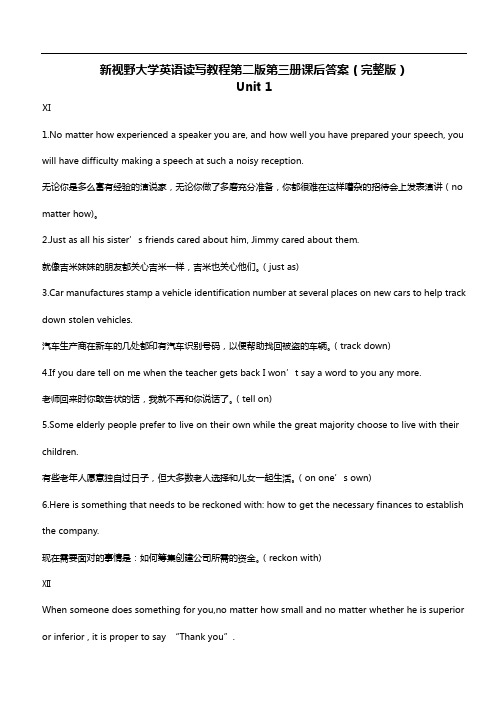
新视野大学英语读写教程第二版第三册课后答案(完整版)Unit 1Ⅺ1.No matter how experienced a speaker you are, and how well you have prepared your speech, you will have difficulty making a speech at such a noisy reception.无论你是多么富有经验的演说家,无论你做了多磨充分准备,你都很难在这样嘈杂的招待会上发表演讲(no matter how)。
2.Just as all his sister’s friends cared about him, Jimmy cared about them.就像吉米妹妹的朋友都关心吉米一样,吉米也关心他们。
(just as)3.Car manufactures stamp a vehicle identification number at several places on new cars to help track down stolen vehicles.汽车生产商在新车的几处都印有汽车识别号码,以便帮助找回被盗的车辆。
(track down)4.If you dare tell on me when the teacher gets back I won’t say a word to you any more.老师回来时你敢告状的话,我就不再和你说话了。
(tell on)5.Some elderly people prefer to live on their own while the great majority choose to live with their children.有些老年人愿意独自过日子,但大多数老人选择和儿女一起生活。
(on one’s own)6.Here is something that needs to be reckoned with: how to get the necessary finances to establish the company.现在需要面对的事情是:如何筹集创建公司所需的资金。
- 1、下载文档前请自行甄别文档内容的完整性,平台不提供额外的编辑、内容补充、找答案等附加服务。
- 2、"仅部分预览"的文档,不可在线预览部分如存在完整性等问题,可反馈申请退款(可完整预览的文档不适用该条件!)。
- 3、如文档侵犯您的权益,请联系客服反馈,我们会尽快为您处理(人工客服工作时间:9:00-18:30)。
Text Translation:Unit2 继承陈嘉庚精神1961年8月12日陈嘉庚先生在京病逝,享年87岁。
中华人民共和国政府为他举行了国葬。
即使在弥留之际,陈先生仍然热衷于他奋斗一生的公共教育事业,留下遗嘱将所有的钱(一百万人民币元)捐给家乡的学校。
陈先生留下了嘉庚公园(Jiageng Park),一座国家纪念馆,位于中国东南海岛城市厦门集美(Jimei,Xiamen)东南沿海的一个小岛上。
1990年3月11日,中国国际小行星中心命名中国科学院紫金山天文台发现的第2963号小行星为“陈嘉庚星”(“Tan Kah Kee Star”),纪念他对教育事业所做的卓越贡献。
命名仪式在厦门大学(Xiamen University)举行。
除了“陈嘉庚星”和许多处纪念馆,陈嘉庚在海外华人心目中有着非常高的地位,1992年部分世界上最杰出的华人在香港(Hong Kong)举行会议,成立了陈嘉庚国际协会(the Tan Kah Kee International society)。
这个协会旨在为人类社会的幸福促进科学和文化的发展。
正如中国为陈嘉庚建立了纪念馆一样,在新加坡(Singapore)人们通过捐献、基金会和奖学金的形式来纪念他。
新加坡华侨中学(the Chinese High School)专门在校园的钟楼前为其奠基人陈嘉庚塑立了铜像。
新加坡的后人仍然受益于他的慷概赞助。
陈嘉庚青少年发明奖(Mr Tan’s Young Inventors’Award)仍然赞助初露头角的年青科学家和发明家,激励着新加坡科学界,在促进新加坡的科学研究能力方面发挥了重要作用。
.除了亚洲,在美国(the United Sates)也可以找到陈嘉庚的名字。
1993年4月28日,经著名科学家李远哲(Lee Yuan Tseh)教授和田长霖(Tien Chang-Lin)教授推荐并积极努力,加里福尼亚大学柏克莱校区化工学院(the school of Chemistry at University of California,Berkeley)新建的一座楼被命名为“陈嘉庚楼”(“Tan Kah Kee Hall”)。
陈嘉庚楼的建成意味着陈嘉庚的高尚精神和人生观也已被西方社会所接受,使他的榜样进一步扩大和扎根于世界各地。
陈嘉庚大事年表1874年10月21日(阴历九月十二日)生于中国福建省同安县集美村(Tung An District,Fujian Province,China)。
1882年9岁。
在村里的南轩私塾(Nan Xuan Private School)就学。
1890年17岁,第一次出洋新加坡。
1891年18岁。
在其父所营顺安米店学商。
1893年21岁。
归国与张氏(Mdm Teo)成婚。
1895年22岁。
第二次出洋新加坡。
同年台湾被割让给日本11898年25岁。
回国奔母丧。
1899年26岁。
携妻张氏第三次出洋新加坡,在顺安米店经商。
1900年27岁。
归国葬母。
1903年30岁。
第四次出洋新加坡。
1904年31岁。
在此后三年间,奠定了坚实的经济基础,创业有成,为自己在新加坡和马来亚的华人领袖地位地位辅平了道路。
他的实业包括菠萝加工厂、米店和橡胶种植园。
1910年37岁。
加入孙中山(Dr. Sun Yat Sen)先生的中国革命同盟会(Tung Meng Hui),致力于推翻满清政府统治。
1911年38岁。
被推为福建保安捐款委员会(the Preservation of Peace Society)会长,筹款二十多万元支援福建财政(Hokien Province Recovery Regime),另筹五万元接济孙中山先生的民国政府。
1912年39岁。
携眷回国,筹办集美学校(Ji Mei Primary School)。
1913年40岁。
集美学校正式开学。
第五次出洋新加坡。
1915年42岁。
租轮四艘,经营航运,获利颇巨。
1916年43岁。
购进三千吨轮船一艘,命名为“东丰号”(“Tong Fong”)。
1917年44岁。
购进三千七百五十吨轮船一艘,名为“谦泰号”(“Khiam Tai”)。
因两年来营业顺利,派胞弟敬贤回国创办集美中学(Ji Mei Secondary School)和集美师范学校(Ji Mei Normal School)。
筹款救济天津水灾(Tientsin Relief Fund)。
1918年45岁。
集美师范和中学正式开学。
发起筹办新加坡南洋华侨中学。
为广东教济基金(Guangdong Relief Fund)筹款。
1919年46岁。
新加坡南洋华侨中学正式开学。
回国筹办厦门大学。
组织同安县教育会(Tung An Education Committee),对各乡小学给予常年补助,受益者三十多校。
捐款赞助南洋侨中学(Singapore Anglo Chinese School)。
1920年47岁。
集美学校增设女子师范(Woman’s Normal School)和商科(Commercial School)。
创办集美水产航海学校(Ji Mei Marine School)。
1921年48岁。
厦门大学在集美开学。
林文庆(Lim Boon Keng)被任命为校长。
1922年49岁。
在新加坡扩大橡胶种植园。
1923年50岁。
在新加坡创办《南洋商报》(《Nanyang Siang Pau》)。
被选为怡和轩俱乐部(Ee Hoe Hean Club)总理。
1925年52岁。
实业达到顶峰,公认为东南亚的企业先驱。
1926年53岁。
扩建南洋华侨中学校舍。
创办集美农林学校(Ji Mei Farming and Forestry School)。
但公司开始面临逆境,胶价暴跌,营业亏损甚巨,被迫将厦大和集美两校校舍建筑工程局部停工,但经费仍竭力维持。
1928年55岁。
5月3日,日军侵占济南(Jinan),陈嘉庚组织山东残祸筹赈会(Shandong Relief Fund committee),募款救济受祸难胞。
1929年56岁。
当选为新加坡福建会馆(Singapore Hokkien Huay Kuan)主席。
筹款资助莱佛士书院(Raffles Institution)。
1934 年61岁。
参与河水山火灾振济基金会(Bukit Ho Swee Fire Relief Fund)工作。
.1937年64岁。
发起组织新加坡筹赈会(Singapore China Relief Fund),被推担任主席,捐募新加坡币一千万元,支援祖国抗日战争。
1938年65岁。
被选为南洋华侨筹赈祖国难民总会(Relief Committee of Nanyang Overseas Chinese for China’s Refugees)主席。
致电汪精卫(Wang Jingwei)反对其主张同日本和谈。
1939 年66岁。
在新加坡创办水产航海学校(Marine and Navigation School)。
1940年67岁。
组织"南洋华侨回国慰劳视察团"(“the Overseas Chinese Consolation and Inspection Team”),并率团返国到重庆(Chongqing)、延安(Yanan)等地视察慰问。
1941年68岁。
被推为南侨总会(the Relief Committee of Nanyang Overseas Chinese for China’s Refugees)第二届主席。
创办南洋华侨师范学校(Nanyang Overseas Chinese Normal School)。
12月7日,日军偷袭珍珠港(Pearl Harbour),太平洋战争(the Pacific War)爆发,领导组织新加坡华侨抗敌总会(the Committee of Mobilization of Singapore Overseas Chinese)抗击日寇。
1942年69岁。
新加坡沦陷,避居印度尼西亚东爪哇的山城玛琅(Marang of East Java)三年,开始写作《南侨回忆录》(《Memoir of Nanyang Overseas Chinese》)。
1945年72岁。
日本战败投降,重返新加坡。
1946年73岁。
创办新加坡《南侨日报》(《Nan Qiao Jit Poh》)。
支持尼赫鲁(Nehru)的印度独立运动(India’s independence movement)。
1947年74岁。
召开新加坡华侨大会,反对荷兰殖民军(Dutch colonists)屠杀印尼(Indonesian)巨港华侨暴行,议决准备对荷兰实行经济制裁。
为集美各校开拓经费来源,在香港创办集友银行(Jiyou Bank),实行以行养校,是史无前例的创举。
1949年76岁。
抗日战争胜利后首途回国。
1950年77岁。
最后一次出洋新加坡,结束未了事务。
当年回国定居故乡集美村,亲自主持集美、厦大两校校舍的修建。
建议修建福建境内铁路。
1955年82岁。
在祖国各地参观视察,足迹遍布东北、西北和西南16个省区。
1956年83岁。
当选为中华全国归国华侨联合会(Overseas Chinese Association)主席。
1959年86岁。
创立厦门华侨博物院(Overseas Chinese Museum inXiamen)。
1961年88岁。
在北京逝世,遗体移集美鳌园(Jimei Village)安葬,并举行了隆重的国葬仪式。
注释:1 1895年中日甲午战争后,清朝政府与日本订立了丧权辱国的《马关条约》,将辽东半岛、台湾岛及所有附属各岛屿、澎湖列岛割让给日本。
2 怡和轩俱乐部系1895年10月由李清渊、陈若锦(福建永春人)、林文庆(福建海澄人)等人发起成立,历史上曾为新加坡华社核心机构,会员均为新加坡华人侨领和商界领袖人物。
初期会员不多,1939年增至100多人。
初为总理制,1930年改主席制。
该俱乐部本着“天下兴亡,匹夫有责”、“无党无派、关心民族、关心国家”的精神,积极支援祖国辛亥革命、抗日战争,参与区域性重大活动。
开展禁毒、提倡卫生、赞助公益活动。
1937年组织新加坡华侨筹赈祖国难民委员会及新加坡华侨自由公债劝募委员会。
1938年建立马来西亚华侨筹赈会联合通讯处。
同年发起组织以陈嘉庚为主席的“南侨总会”,成为“南侨总会”总部。
抗日战争胜利后,曾积极支持祖国的解放战争。
新加坡独立后,主要开展推动新加坡经济建设和社区公益、慈善、教育文化事业等活动,积极促进中新两国友好交往和中国经济建设。
历任主席(总理)是:林推迁(1914~1922年任职)、陈嘉庚(1923~1926、1928~1930、1935~1947)、林义顺(1927、1931~1932)、李俊承(1934~1935)、陈六使(1948~1963)、高德根(1963~1965)、孙炳炎(1965-2001)。
